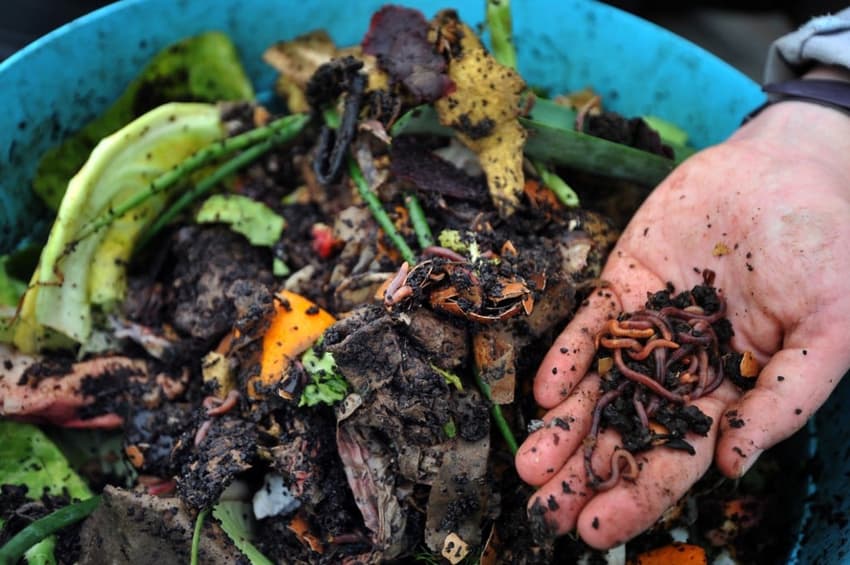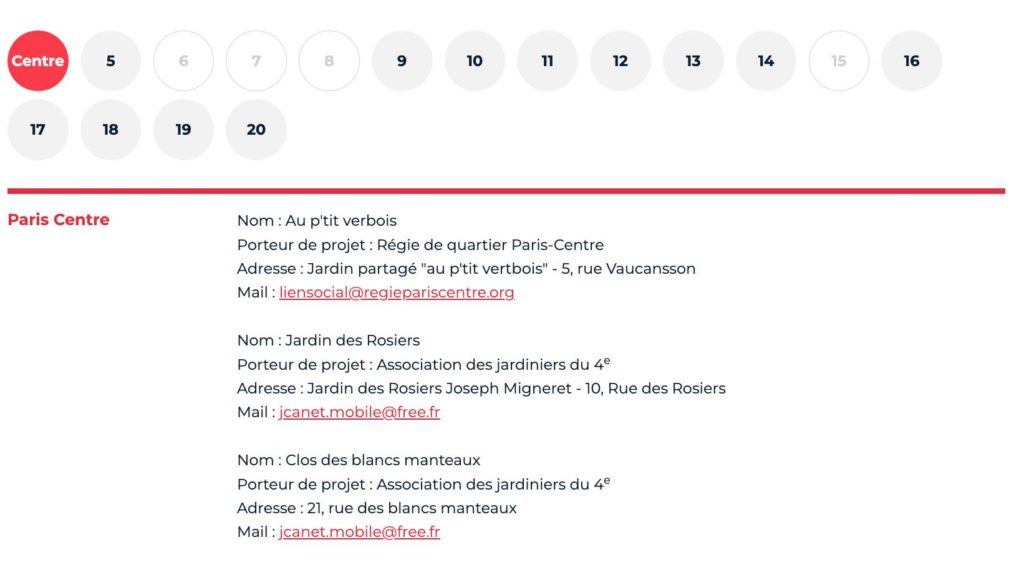Free worms: How to start composting in France

Wondering how you can start composting in France? Here is what you need to know about the environmentally-friendly way of getting rid of your food waste.
Composting is about to get a lot more accessible in France, as local authorities will be required to offer households means of sorting biodegradable waste at source.
Starting in January 2024, all local authorities across the country will need to give households a way to compost - whether that be via separate bins for collection, individual or collective composting.
READ MORE: All French households will have to be offered composting bin
But many local authorities already do this, and even if they don't there's no need to wait until January 2024 to recycle your kitchen scraps, old flowers and other bio-waste.
Public composting sites
If you're looking for a shared or public composting site, the first step you can take is to look at the interactive map created by Zero Waste France. You can find it HERE, where you can simply put in your address to see what options are available close to you.
Another option would be to look at the website for your local Mairie (Town Hall) to search for the nearest "composteur de quartier" (neighbourhood composting bin). For those living in the Greater Lyon area, you can consult the interactive map and address log of shared composting bins HERE.
In Paris, those looking to compost can use the city's Town Hall website to see the composting locations listed out by arrondissement and address. If you scroll to the middle of the page then click on your arrondissement number, you will get a list of nearby options.

A screenshot of the dropdown list of composting options in Paris
You will also need to check
For those living in cities, you might consider joining a community garden if you are looking to use your composting to grow fruits and vegetables, or if you are simply looking for an alternative place to get rid of your compost. To join a community garden (jardin partagé) you must contact the association managing it. In larger cities, like Paris, there might be a waitlist. You can find more information HERE.
Compost individually
It's easy to get a compost bin for your kitchen to collect your food and biodegradable waste together, but if you actually want to create compost that will go straight onto your garden then you will probably need the help of some worms.
Depending on where you live in France, you might be eligible for a free or reduced price individual worm composting bin. For those living in Paris, you can get a free worm composting bin during one of the city's distribution campaigns, which are usually announced on the Town Hall's website. You will also need to attend a short, 45-minute training session to learn how to use the worm composting bin.
In other parts of France, like the Aix-Marseille-Provence metropolitan area you can order a €10 wooden composter or an individual worm composter on the local authority's website, found HERE.
If you live in the Greater Lyon area, you can apply for your local town hall to send you composting materials for free by going on THIS website and by providing documents, such as a piece of identification, proof of address, and a photo of your garden.
Many local authorities have similar schemes, so check the situation on a lombricomposteur (worm-composter) with your local mairie.
Where can I get compost for my garden?
If you are looking to get compost, the first place you might consider would be your local landfill or waste disposal centre (déchetterie). Some communes will give away free bags of compost, and others have deals set up where you can bring in your own biodegradable items in exchange for getting a bag of compost.
What are you allowed to compost in France?
While local authorities might have differing recommendations, on a general level it is recommended that you compost: Kitchen waste - peelings, coffee grounds, paper filters, vegetable tops, and spoiled fruits and vegetables; Garden waste - grass clippings, leaves, and dead flowers; and some household waste - house plants, tissues, paper towels, newspaper, wood ashes, and sawdust.
There are also some things that you might be able to compost, but you should take some additional steps, like hard waste that cannot degrade easily (cabbage cores, bones, branches, fruit pits, egg shells), which should be crushed down beforehand.
Some localities have specific rules regarding composting meat. In Paris, residents are advised against composting meat and fish, as they can attract rodents.
You should always avoid composting any non-biodegradable synthetic products, like glass, metals, plastics (even if it is "biodegradable plastic"), or synthetic cleaner bags. Many types of diapers (nappies) are not biodegradable, so consider this before attempting to compost them. Any type of wood that has been painted or chemically treated should not be composted, and no chemical products (such as oil) should be composted.
If you are using a vermicomposter (worm composter) should also avoid putting in citrus fruits, garlic and onions.
As for the city of Paris, local authorities recommend not composting dairy products (especially cheese), bread, and meat.
Why should I consider composting?
There are many benefits to composting. As an individual, composting might save you money by allowing you to avoid buying synthetic fertilisers.
Recycling organic waste also helps to limit pollution. When biodegradable waste is collected with other types of waste and put into landfills, it produces toxic emissions. Composting helps to reduce the toxic gases that are sent into the atmosphere, and in turn reduces pollution.
It also makes us less dependent on landfills and helps to make soil richer and healthier, which aids in water retention.
Helpful vocabulary
To compost - Composter
A communal composting bin - un composteur collectif
Worm composter or vermicomposter - lombricomposteur
Landfill/ Waste disposal centre - Déchetterie
Comments
See Also
Composting is about to get a lot more accessible in France, as local authorities will be required to offer households means of sorting biodegradable waste at source.
Starting in January 2024, all local authorities across the country will need to give households a way to compost - whether that be via separate bins for collection, individual or collective composting.
READ MORE: All French households will have to be offered composting bin
But many local authorities already do this, and even if they don't there's no need to wait until January 2024 to recycle your kitchen scraps, old flowers and other bio-waste.
Public composting sites
If you're looking for a shared or public composting site, the first step you can take is to look at the interactive map created by Zero Waste France. You can find it HERE, where you can simply put in your address to see what options are available close to you.
Another option would be to look at the website for your local Mairie (Town Hall) to search for the nearest "composteur de quartier" (neighbourhood composting bin). For those living in the Greater Lyon area, you can consult the interactive map and address log of shared composting bins HERE.
In Paris, those looking to compost can use the city's Town Hall website to see the composting locations listed out by arrondissement and address. If you scroll to the middle of the page then click on your arrondissement number, you will get a list of nearby options.

You will also need to check
For those living in cities, you might consider joining a community garden if you are looking to use your composting to grow fruits and vegetables, or if you are simply looking for an alternative place to get rid of your compost. To join a community garden (jardin partagé) you must contact the association managing it. In larger cities, like Paris, there might be a waitlist. You can find more information HERE.
Compost individually
It's easy to get a compost bin for your kitchen to collect your food and biodegradable waste together, but if you actually want to create compost that will go straight onto your garden then you will probably need the help of some worms.
Depending on where you live in France, you might be eligible for a free or reduced price individual worm composting bin. For those living in Paris, you can get a free worm composting bin during one of the city's distribution campaigns, which are usually announced on the Town Hall's website. You will also need to attend a short, 45-minute training session to learn how to use the worm composting bin.
In other parts of France, like the Aix-Marseille-Provence metropolitan area you can order a €10 wooden composter or an individual worm composter on the local authority's website, found HERE.
If you live in the Greater Lyon area, you can apply for your local town hall to send you composting materials for free by going on THIS website and by providing documents, such as a piece of identification, proof of address, and a photo of your garden.
Many local authorities have similar schemes, so check the situation on a lombricomposteur (worm-composter) with your local mairie.
Where can I get compost for my garden?
If you are looking to get compost, the first place you might consider would be your local landfill or waste disposal centre (déchetterie). Some communes will give away free bags of compost, and others have deals set up where you can bring in your own biodegradable items in exchange for getting a bag of compost.
What are you allowed to compost in France?
While local authorities might have differing recommendations, on a general level it is recommended that you compost: Kitchen waste - peelings, coffee grounds, paper filters, vegetable tops, and spoiled fruits and vegetables; Garden waste - grass clippings, leaves, and dead flowers; and some household waste - house plants, tissues, paper towels, newspaper, wood ashes, and sawdust.
There are also some things that you might be able to compost, but you should take some additional steps, like hard waste that cannot degrade easily (cabbage cores, bones, branches, fruit pits, egg shells), which should be crushed down beforehand.
Some localities have specific rules regarding composting meat. In Paris, residents are advised against composting meat and fish, as they can attract rodents.
You should always avoid composting any non-biodegradable synthetic products, like glass, metals, plastics (even if it is "biodegradable plastic"), or synthetic cleaner bags. Many types of diapers (nappies) are not biodegradable, so consider this before attempting to compost them. Any type of wood that has been painted or chemically treated should not be composted, and no chemical products (such as oil) should be composted.
If you are using a vermicomposter (worm composter) should also avoid putting in citrus fruits, garlic and onions.
As for the city of Paris, local authorities recommend not composting dairy products (especially cheese), bread, and meat.
Why should I consider composting?
There are many benefits to composting. As an individual, composting might save you money by allowing you to avoid buying synthetic fertilisers.
Recycling organic waste also helps to limit pollution. When biodegradable waste is collected with other types of waste and put into landfills, it produces toxic emissions. Composting helps to reduce the toxic gases that are sent into the atmosphere, and in turn reduces pollution.
It also makes us less dependent on landfills and helps to make soil richer and healthier, which aids in water retention.
Helpful vocabulary
To compost - Composter
A communal composting bin - un composteur collectif
Worm composter or vermicomposter - lombricomposteur
Landfill/ Waste disposal centre - Déchetterie
Join the conversation in our comments section below. Share your own views and experience and if you have a question or suggestion for our journalists then email us at [email protected].
Please keep comments civil, constructive and on topic – and make sure to read our terms of use before getting involved.
Please log in here to leave a comment.